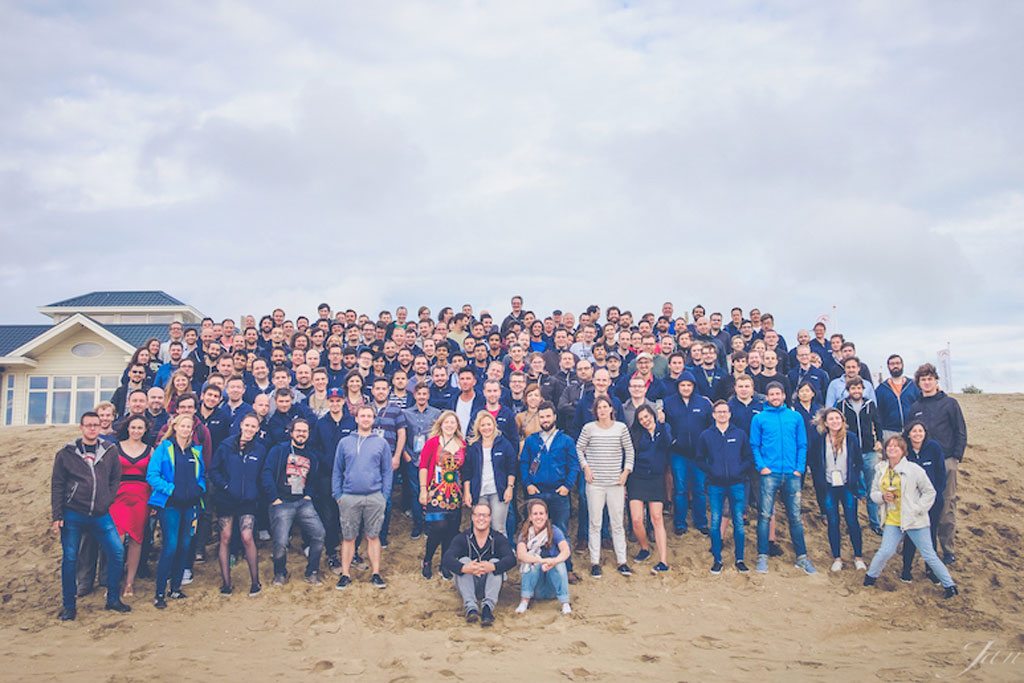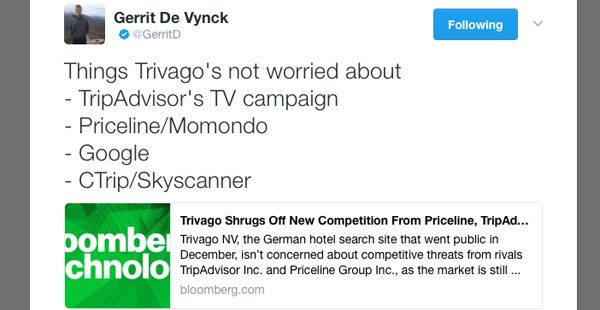Trivago Thinks It Knows How to Outwit Google

Skift Take
Last Friday, in the company's first earnings call since going public, Trivago's chief executive officer Rolf Schrömgens answered analyst questions about competition. He said he wasn't worried about rivals TripAdvisor, Priceline’s Kayak (and its new acquisition Momondo Group), or Chinese travel conglomerate Ctrip.com (and its new acquisition Skyscanner).
But the one company he didn't mention was Google.
In a Recode podcast with Kara Swisher released February 15, Schrömgens says he feels that Google is Trivago's only real competitor.
And he thinks Trivago has outwitted the search giant.
Schrömgens recalls that around 2008, Trivago faced a problem. About 90 percent of its traffic came via referrals from Google. In short, the budding price-comparison website was dependent on the search giant, which could slowly close the traffic hose at any time.
That's when the Düsseldorf-based company decided to build up its brand recognition through marketing, starting in Germany.
In other words, you can blame Google for the creation of the memorably annoying Trivago Guy.
Fast forward to last Friday, when the company (which is part-owned by Expedia) reported that about three out of four bookings on Trivago come from customers who came directly to the site by typing in the name into their search browsers.
GOOGLE CAN'T WIN
Earlier this week Trivago told Skift that it prioritizes keeping its organization nimble and transparent, by not having job titles and aggressively rotating employees. It also keeps its focus strictly on hotel search, not veering into flights or other products.
Schrömgens tells Recode, "When Google started [doing hotel search, in 2010], I remember that very well. Because one of our managing directors today [Johannes Thomas], he was an intern at that time. And he stood up in a company update that we do every year, and he stood up and said, “Guys, why are we here? Google is starting Hotel Finder. We’ll have no chance.”
But in reality, Trivago now sells more hotels than Google does, despite the Mountain View giant's advantages.

Schrömgens tells Swisher that Google can't win in travel because it's too big: "The problem is if an organization becomes larger and more complex, a very interesting mechanism happens within these organizations. ... It’s not because there are not very smart people there. It’s just that the complexity grows exponentially."
Schrömgens predicts that what will rise will be "a platform of vertical searches rather than one search does everything for you" and, implicitly, that Trivago will be one of those vertical searches.
Swisher asks Schrömgens about Airbnb, and he responds that vertical search will not be split up into hotels as a category and home-sharing as a category and whole-home vacation rentals as a category and serviced residences as a category. He predicts that "an ideal place to stay" will become the overarching theme of the vertical. "At the end, I think it’s a very artificial kind of separation of saying, 'This is a hotel, and this is an apartment house, and this is a private apartment, and so on and so on.'"
Trivago doesn't offer Airbnb properties right now, but it does have some private-lodging rentals in its listings.
Like many, the CEO predicts that Airbnb will be "professionalized" and that most of the lodging will stop being self-managed by individuals and will get managed by full-time property managers. "Because what I see is I look at Airbnb rather like [the early] eBay, eBay for accommodations." In the early days, eBay had many hobbyist sellers, but now most of the stuff is sold by full-time retailers.
The CEO also says that "countries that fear immigrants are killing innovation and they’re leaving themselves open to startup-style disruption," in the paraphrase of Recode. Here is the podcast, here, or read the transcript.





